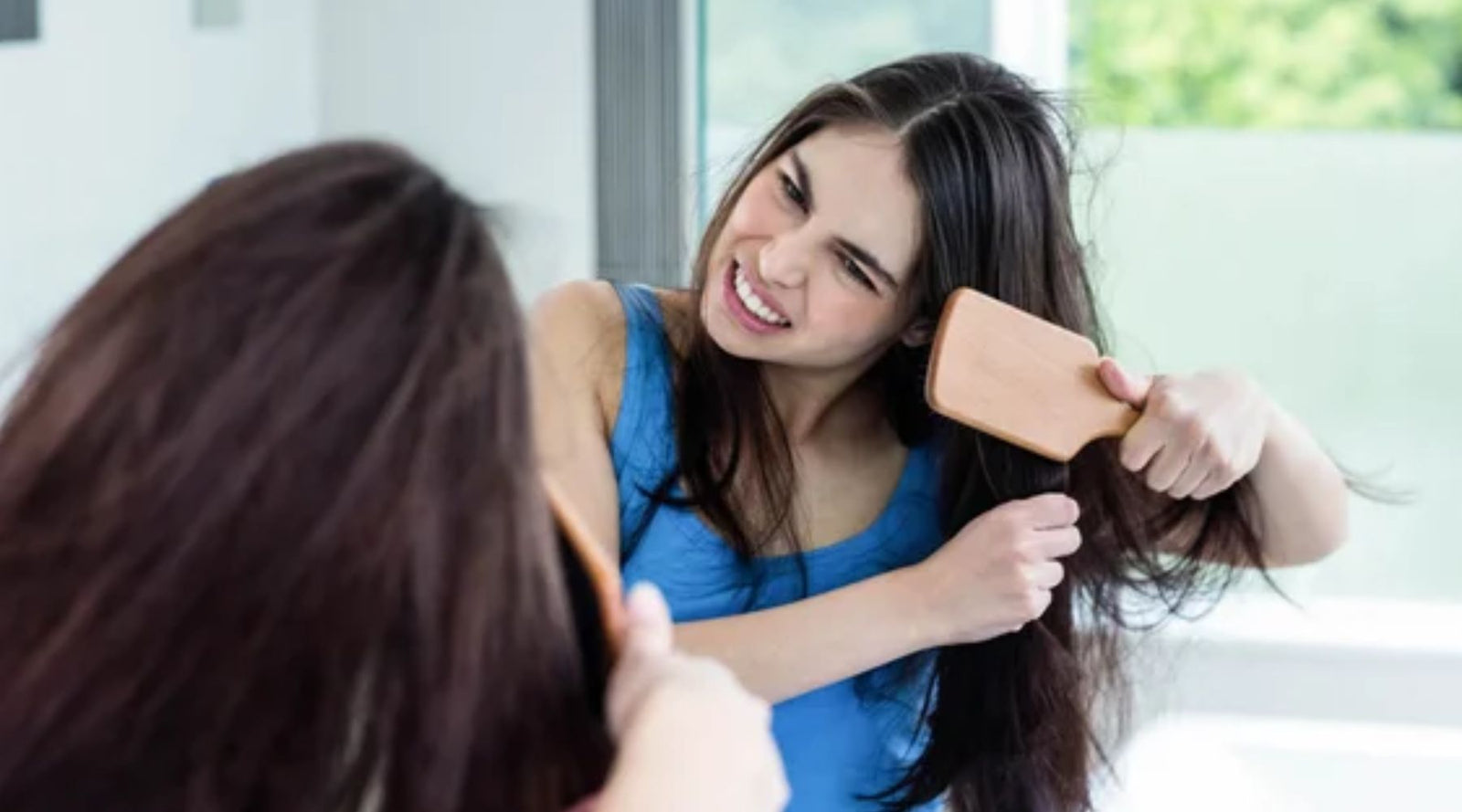Your Cart is Empty
FREE SHIPPING│ NO SALES TAX│ PRICE BEAT GUARANTY
Have a question? Call us 7 days a week!
FREE SHIPPING│ NO SALES TAX│ PRICE BEAT GUARANTY
All Filtration
Hard Water Hair - Understanding the Signs and Solutions
September 12, 2024 8 min read

Is Your Hair Feeling Dry and Dull? Learn More About the Effect of Hard Water on Hair!
If you’ve noticed your hair feeling dry, frizzy, or even more difficult to manage, there’s a chance you might be dealing with hard water hair. Hard water refers to water that contains high levels of minerals like calcium and magnesium, which can build up on your hair over time, leaving it looking and feeling less than its best.
This is especially true for color treated hair, which is more susceptible to damage, fading color, and dullness from hard water compared to untreated hair. But how do you know for sure that hard water is the culprit?
In this blog post, we’ll explore how to tell if you have hard water hair, the impact it can have on your hair and skin, and some effective solutions for treating it.

What Is Hard Water Hair?
“Hard water hair” refers to the condition your hair develops when exposed to mineral-rich water over an extended period. These minerals coat the hair shaft, making it harder for moisture and other nourishing ingredients to penetrate, which can negatively impact your hair's health and result in various hair concerns.
Let’s look at some common signs of hard water hair and how you can determine if it’s affecting you.
Definition of Hard Water
Hard water is a type of water that contains high levels of dissolved minerals, particularly calcium and magnesium. These minerals can come from various sources, including underground aquifers, wells, and even the Earth’s crust.
When water flows through these mineral-rich areas, it picks up particles that can affect its quality. Hard water is often identified by its characteristic effects on hair, skin, and household appliances, such as leaving mineral deposits on surfaces and making it difficult to achieve a good lather with soap.
Signs You Have Hard Water Hair
Dryness and Frizziness: One of the most noticeable signs of hard water on your hair is increased dryness. Dry hair is a symptom of hard water damage, as hard water minerals create a film on your hair that blocks moisture from getting in. As a result, your hair may become frizzy, brittle, and more prone to breakage.

Dull Appearance: Does your hair lack shine? Hard water minerals can strip your hair of its natural oils, leaving it looking dull and lifeless, no matter how many products you use.

Difficulty Lathering Shampoo: If you’ve ever noticed that your shampoo doesn’t seem to lather as much, hard water could be the issue. The minerals in hard water interact with the ingredients in shampoos, reducing their effectiveness and making it harder to get a good cleanse.

Increased Hair Breakage and Split Ends: If you find yourself dealing with an abnormal amount of breakage or split ends, the buildup of hard water minerals could be causing hair damage over time. These minerals weaken your hair strands, leading to increased breakage and split ends.

Hair Loss: Although less common, some people experience hard water hair loss due to clogged hair follicles. The minerals in hard water can form deposits on the scalp, leading to reduced circulation, which could contribute to hair thinning or shedding.

Hard Water and Its Impact on Skin
Not only does hard water affect your hair, but it also has visible effects on your skin. Here are some signs of hard water on skin that you may notice:
-
Dryness and Itchiness: Just as hard water can dehydrate your hair, it can also strip your skin of essential moisture, leaving it feeling dry and itchy.
-
Irritation: Hard water may aggravate sensitive skin or existing conditions like eczema and psoriasis. The mineral deposits can block pores, leading to irritation and breakouts.
-
Soap Scum: When hard water combines with soap, it creates a residue that can leave a film on your skin, making it feel greasy or unclean, even after showering.
Causes of Hard Water
The presence of dissolved minerals in the water supply is what causes hard water. These minerals can originate from several sources:
-
Underground Aquifers: As water travels through underground rock formations, it can absorb minerals like calcium and magnesium.
-
Wells: Water drawn from wells often taps into these underground aquifers, bringing mineral-rich water to the surface.
-
Earth’s Crust: Minerals from the Earth’s crust can leach into the water supply, contributing to its hardness.

Identifying Hard Water in Your Home
Identifying hard water in your home can be done through a variety of methods:
-
Checking for Mineral Deposits: Look for white or off-white deposits on your dishes, glasses, and shower walls. These are signs of mineral buildup.
-
Feeling the Water: Hard water can feel rough or sticky on your skin, making it less pleasant to wash with.
-
Checking Your Hair: If your hair feels dry, brittle, and prone to breakage, hard water might be the culprit.
-
Using a Water Testing Kit: For a more precise measurement, you can purchase a water testing kit to check the mineral levels in your water. This can give you a clear indication of whether you have hard water.

How to Repair Hair that has Been Damaged from Hard Water
Once you’ve identified that hard water is contributing to your hair problems, you’ll likely want to explore ways to treat it. Certain treatments can help restore moisture and shine to damaged hair.
A pre-shampoo treatment can enhance the efficacy of your regular hair-washing routine. Fortunately, there are several effective hard water hair treatment options available:
-
Chelating Shampoo: This type of shampoo is specifically designed to remove mineral buildup from your hair. It can be used once a week to keep your hair free from the negative effects of hard water.
-
Vinegar Rinse: A vinegar rinse can help to balance the pH of your hair and remove mineral deposits. Mix one part vinegar with two parts water and use it as a final rinse after shampooing and conditioning.
-
Leave-In Conditioner: Using a leave-in conditioner can help to lock in moisture and protect your hair from the drying effects of hard water. Look for products that contain ingredients like argan oil or shea butter.
-
Clarifying Shampoo: Similar to chelating shampoo, clarifying shampoo can help to remove buildup from your hair. However, it is generally less harsh and can be used more frequently.
-
Shower Head Filter: Installing a shower head filter can prevent hard water damage by removing minerals before they reach your hair. This can improve water quality and help maintain healthier hair.
By incorporating these treatments and preventive measures into your hair care routine, you can mitigate the effects of hard water and keep your hair looking its best.

1. Clarifying Shampoo
A clarifying shampoo is specifically designed to remove mineral buildup from your hair. Use it once a week or as needed to strip away the residue left behind by hard water. Look for clarifying shampoos with ingredients like EDTA (ethylenediaminetetraacetic acid), which bind to the minerals and wash them away.
2. Vinegar Rinse
A simple apple cider vinegar rinse can help balance your hair’s pH and remove some of the hard water buildup. Mix one part vinegar with two parts water, and apply it to your hair after shampooing. Let it sit for a few minutes before rinsing thoroughly. This remedy is great for bringing back shine and softness.
3. Chelating Shampoo
Unlike regular clarifying shampoos, chelating shampoos contain stronger agents that can more aggressively remove mineral deposits. This type of shampoo is ideal for those dealing with heavy hard water buildup and should be used sparingly.
4. Moisturizing Hair Masks
Since hard water tends to dry out your hair, using a hair mask to restore hydration is essential. A nourishing hair mask, applied at least twice a week post-shampoo, can significantly restore moisture and shine. Look for masks rich in ingredients like shea butter, argan oil, or keratin to repair damage and keep your hair soft and manageable.
5. Install a Shower Filter
Installing a shower filter can help remove minerals and contaminants from the water, reducing the effects of hard water on your hair. Look for a filter that is specifically designed to remove calcium and magnesium ions, which are the primary minerals that cause hard water. Some popular options include:
-
Activated Carbon Filters: These filters use activated carbon to absorb minerals and contaminants, providing cleaner water for your showers.
-
Ion Exchange Filters: These filters use ion exchange technology to remove minerals and contaminants, effectively softening the water.
By installing a shower filter, you can significantly reduce the impact of hard water on your hair, helping to maintain its natural shine and health.

6. Consider a Whole-House Water Softener
A whole-house water softener can help remove minerals and contaminants from the water supply, reducing the effects of hard water on your hair and skin. These systems use ion exchange technology to remove calcium and magnesium ions, replacing them with sodium or potassium ions. Some popular options include:
-
Salt-Based Systems: These systems use salt to remove minerals and contaminants, effectively softening the water throughout your home.
-
Salt-Free Systems: These systems use alternative technologies, such as magnetic fields or ceramic filters, to remove minerals and contaminants without the use of salt.
Investing in a whole-house water softener can provide long-term benefits for your hair’s health, reducing dryness, breakage, and other issues associated with hard water.

How to Reverse the Effects of Hard Water on Hair
If your hair is already suffering from prolonged exposure to hard water, don’t worry. There are steps you can take to reverse the effects of hard water on hair and restore its health:
-
Switch to a Soft Water Source: One of the most effective long-term solutions is installing a water softener or a shower filter in your home. These systems reduce the mineral content in your water, preventing future buildup and protecting your hair and skin by improving water quality.
-
Protein Treatments: Incorporating protein treatments into your hair care routine can help rebuild strength and repair damage caused by hard water minerals.
-
Regular Haircuts: To prevent further damage, trimming split ends regularly is crucial. This also gives your hair a fresh, healthy start.
-
Hydration: Drinking plenty of water and using hydrating hair products can help to combat the drying effects of hard water. Products with hyaluronic acid or aloe vera are particularly beneficial for retaining moisture.
Maintaining healthy hair through proper treatments is essential. Using pre-shampoo treatments and hair oils can nourish the scalp and improve hair condition from the roots, addressing issues caused by environmental factors while providing both immediate and long-term benefits.
Conclusion
Learning how to tell if you have hard water hair is the first step toward reclaiming your hair’s health and vitality. By recognizing the signs like dryness, dullness, and breakage, and addressing them with proper treatments, you can mitigate the damaging effects of hard water. Whether it’s by using clarifying shampoos, trying a vinegar rinse, or installing a water softener, there are plenty of ways to protect your hair from hard water’s harsh impact. With the right approach, you’ll be able to restore softness, shine, and strength to your hair, and keep it looking its best.
If hard water is affecting both your hair and skin, remember to treat your scalp and body with care. Pay attention to the signs of hard water on skin, and invest in solutions that nourish and protect both your hair and skin from further damage.
Leave a comment
Comments will be approved before showing up.

